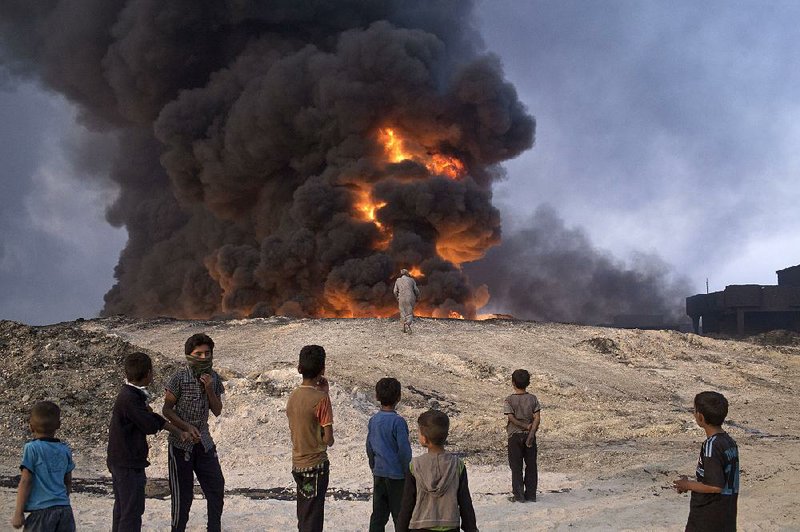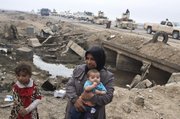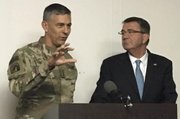KHAZER, Iraq -- Iraqi Kurdish forces pushed toward Mosul on Sunday, cordoning off eight villages and coming within 5½ miles of the northern city held by the Islamic State group, which staged an attack in a western town hundreds of miles away in an apparent diversionary tactic.
The Kurdish forces, known as peshmerga, said the area they cordoned off measures about 38 square miles, and that they also secured a "significant stretch" of highway. The statement said eight car bombs were destroyed in the operation, including three by U.S.-led coalition aircraft, and "dozens" of militants were killed.
The offensive near the town of Bashiqa came nearly a week after Iraq announced the start of the long-awaited Mosul offensive. Iraqi and Kurdish forces are approaching from the north, east and south through a belt of mostly abandoned and heavily mined villages scattered across the Nineveh plain.
Maj. Gen. Haider Fadhi of Iraq's special forces said they also took part in the operation, and that Bashiqa was encircled.
The Islamic State has put up stiff resistance in many areas and has carried out attacks farther afield that appear aimed at diverting attention from the Mosul operation.
Islamic State militants stormed into the town of Rutba, in far western Iraq, unleashing three suicide car bombs that were blown up before hitting their targets, according to the spokesman for the Joint Military Command, Brig. Gen. Yahya Rasool.
He said some militants were killed, without giving an exact figure, and declined to say whether any civilians or Iraqi forces were killed. He said the militants did not seize any government buildings and that the situation "is under control."
The Islamic State-run Aamaq news agency had earlier said militants stormed Rutba from several directions.
Lt. Gen. Stephen Townsend, the top U.S. commander in Iraq, confirmed there had been a complex attack in Rutba and said he expects more such diversionary attacks as Iraqi forces close in on Mosul.
Islamic State militants carried out a large assault on the northern city of Kirkuk on Friday, in which more than 50 militants stormed government compounds and other targets, setting off more than 24 hours of heavy fighting and killing at least 80 people, mainly security troops.
The Mosul offensive involves more than 25,000 Iraqi ground troops as well as U.S.-led coalition aircraft and advisers. It is expected to take weeks, if not months, to drive the Islamic State from Iraq's second-largest city, which is home to more than 1 million civilians.
Bashiqa is close to a military base of the same name where some 500 Turkish troops are training Sunni and Kurdish fighters for the Mosul offensive. Turkey's prime minister, Binali Yildirim, told reporters Sunday that Turkish tanks and artillery had begun aiding the Kurdish forces in the Bashiqa offensive.
The presence of the Turkish troops has angered Iraq, which says it never gave them permission to enter the country and has called on them to withdraw. Turkey has refused, insisting that it play a role in retaking Mosul from the Islamic State.
U.S. Defense Secretary Ashton Carter has visited both countries in recent days, and was in the Kurdish regional capital, Irbil, on Sunday.
After meeting with Turkish leaders, Carter announced an "agreement in principle" for Turkey to have a role in the operation. But Iraqi Prime Minister Haider al-Abadi told Carter on Saturday that Mosul was an "Iraqi battle."
The forces taking part in the Mosul offensive include Iraqi troops, the peshmerga, Sunni tribal fighters and state-sanctioned Shiite militias. Many fear the operation could heighten tensions between Iraq's different communities, which are allied against the Islamic State but divided over a host of other issues, including the fate of territories near mostly Sunni Mosul that are claimed by the largely autonomous Kurdish region and the central government.
Carter met with Kurdish leader Masoud Barzani, as well as U.S. service members, who are not far from the battle. The Pentagon chief said Barzani reported some good news about peshmerga gains against the Islamic State in Bashiqa, about 15 miles northeast of Mosul.
Townsend told reporters that the information he has gathered suggests Barzani was correct and that there has been "considerable success" in the town. Townsend said he didn't know whether any fighting was still going on in the town center and whether every house had been cleared, but he largely confirmed the peshmerga's success and said the Kurdish forces merit recognition for their success.
Carter praised the peshmerga, saying they "fight extremely well," but also acknowledged that they had suffered casualties.
Brig. Gen. Halgord Hekmet, a spokesman for the Kurdish forces, told reporters that 25 of their troops have been killed since the battle to retake Mosul began and a "large number" had been wounded. He said the peshmerga have had good coalition air support, but could use more armored vehicles and roadside bomb detectors. Most of the fallen peshmerga were riding in unarmored vehicles, he said.
The peshmerga are advancing toward Mosul from the north in long columns of armored vehicles and other trucks. More than 100 U.S. special operations troops are embedded with the Kurds and Iraqi military commandos. Irbil is about 55 miles southeast of Mosul.
Mosul is a Sunni majority town, and many worry about the involvement of government-sanctioned Shiite fighters. But they also are suspicious about the Kurds, who have ambitions to expand their self-rule area into parts of Ninevah province, where Mosul is located -- although not to the city itself.
U.S. military officials say the peshmerga will stop their advance about 20 miles outside of Mosul and hold that territory to ensure the militants don't regroup. Shiite militias have said they will not enter the city itself.
Carter also said he wants to see military operations to isolate Islamic State fighters in Raqqa, Syria, to begin "as soon as possible." He said there will be simultaneous operations in Mosul and Raqqa, and that the United States would coordinate in Raqqa with its partners. The U.S. has been working with Syrian rebel fighters.
Townsend said the U.S.-led coalition has had success killing Islamic State leaders, which helps with the Raqqa fight.
The U.N. agency for children, meanwhile, expressed concern over the more than 4,000 people it says have fled from areas around Mosul since the operation began.
UNICEF's Iraq representative, Peter Hawkins, said that in at least one refugee camp the conditions for children were "very, very poor." He said UNICEF teams delivered water, sanitation and other supplies expected to last seven days.
They also provided immunizations against polio and measles, which he said had not been available during the more than two years that the people lived under Islamic State rule. UNICEF has plans to assist more than 784,000 people, including up to 500,000 children.
Hawkins says children in and around Mosul are at risk of death or injury from the fighting, as well as sexual violence, kidnapping and recruitment by armed groups.
Information for this article was contributed by Sinan Salaheddin, Lolita C. Baldor and Maamoun Youssef of The Associated Press.
A Section on 10/24/2016



